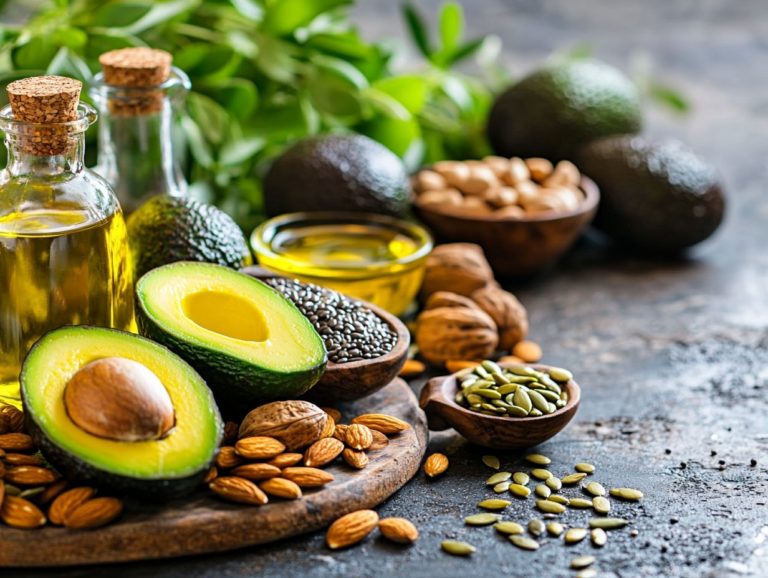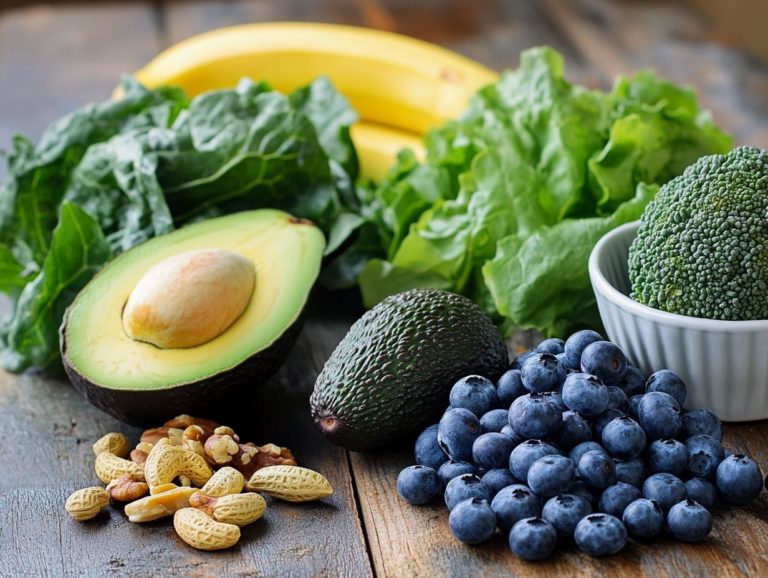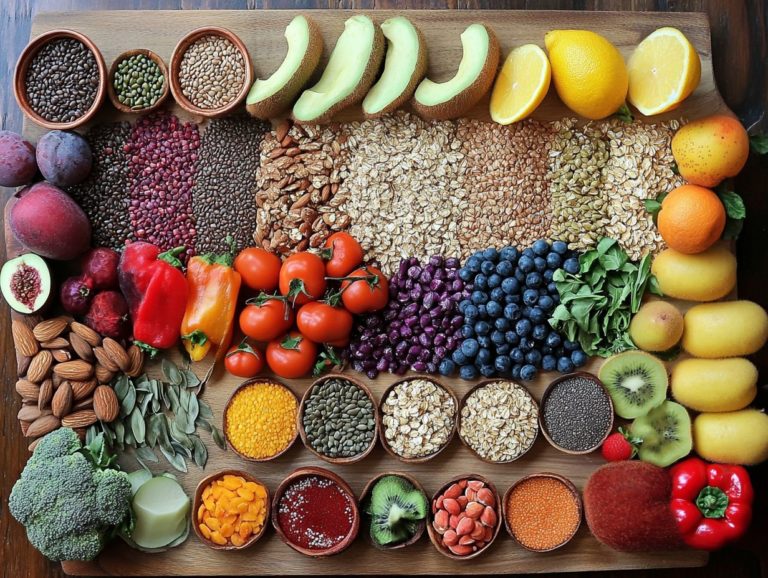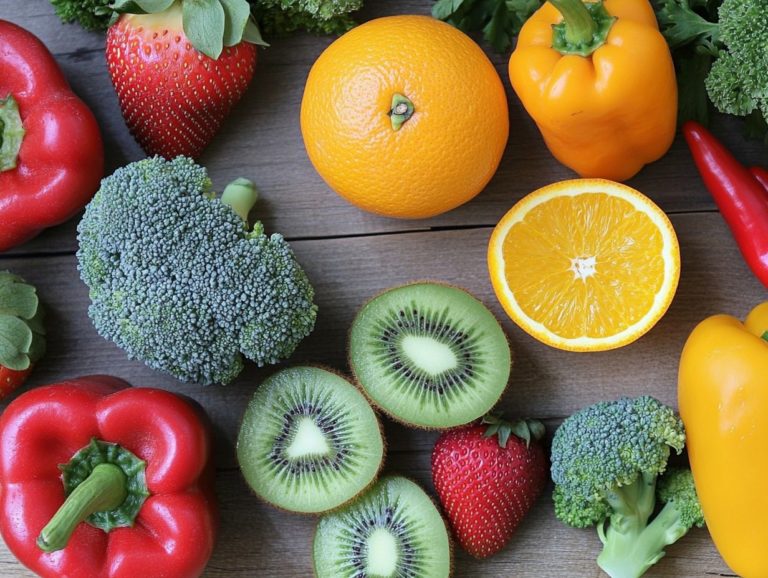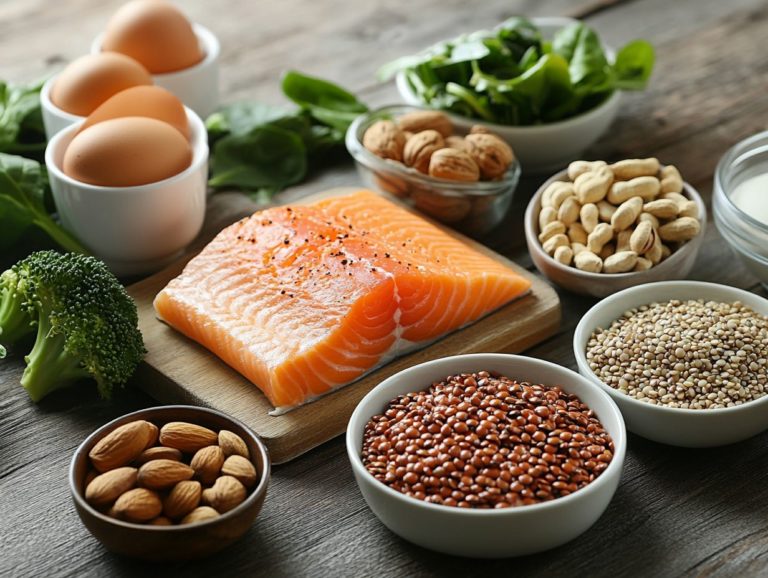5 Foods to Help Manage Cholesterol Levels
Managing your cholesterol levels is essential for maintaining heart health. You might wonder where to begin.
This article explores five foods that can help lower cholesterol: avocados, oats, nuts, fatty fish, and olive oil. We ll also explain what cholesterol is, why it matters, the different types, and how these foods can fit into a heart-healthy diet.
Additionally, you ll find valuable lifestyle tips and a list of foods to avoid.
Discover exciting and simple ways to boost your health today!
Contents
- Key Takeaways:
- 1. Avocados
- 2. Oats
- 3. Nuts
- 4. Fatty Fish
- 5. Olive Oil
- What Is Cholesterol and Why Is It Important to Manage It?
- What Are the Different Types of Cholesterol?
- How Can High Cholesterol Affect Your Health?
- What Are the Recommended Cholesterol Levels?
- How Can These Foods Help Lower Cholesterol?
- What Other Lifestyle Changes Can Help Manage Cholesterol Levels?
- Are There Any Foods to Avoid for High Cholesterol?
- How Often Should One Consume These Foods to See Results?
- Are There Any Risks or Side Effects to Consider?
- Can These Foods Be Beneficial for Those with Normal Cholesterol Levels?
- Frequently Asked Questions
- What are the top 5 foods to help manage cholesterol levels?
- How can avocado help manage cholesterol levels?
- Why are oats recommended for managing cholesterol levels?
- Can fatty fish really help with cholesterol levels?
- How do nuts aid in managing cholesterol levels?
- Is olive oil a good choice for managing cholesterol levels?
Key Takeaways:
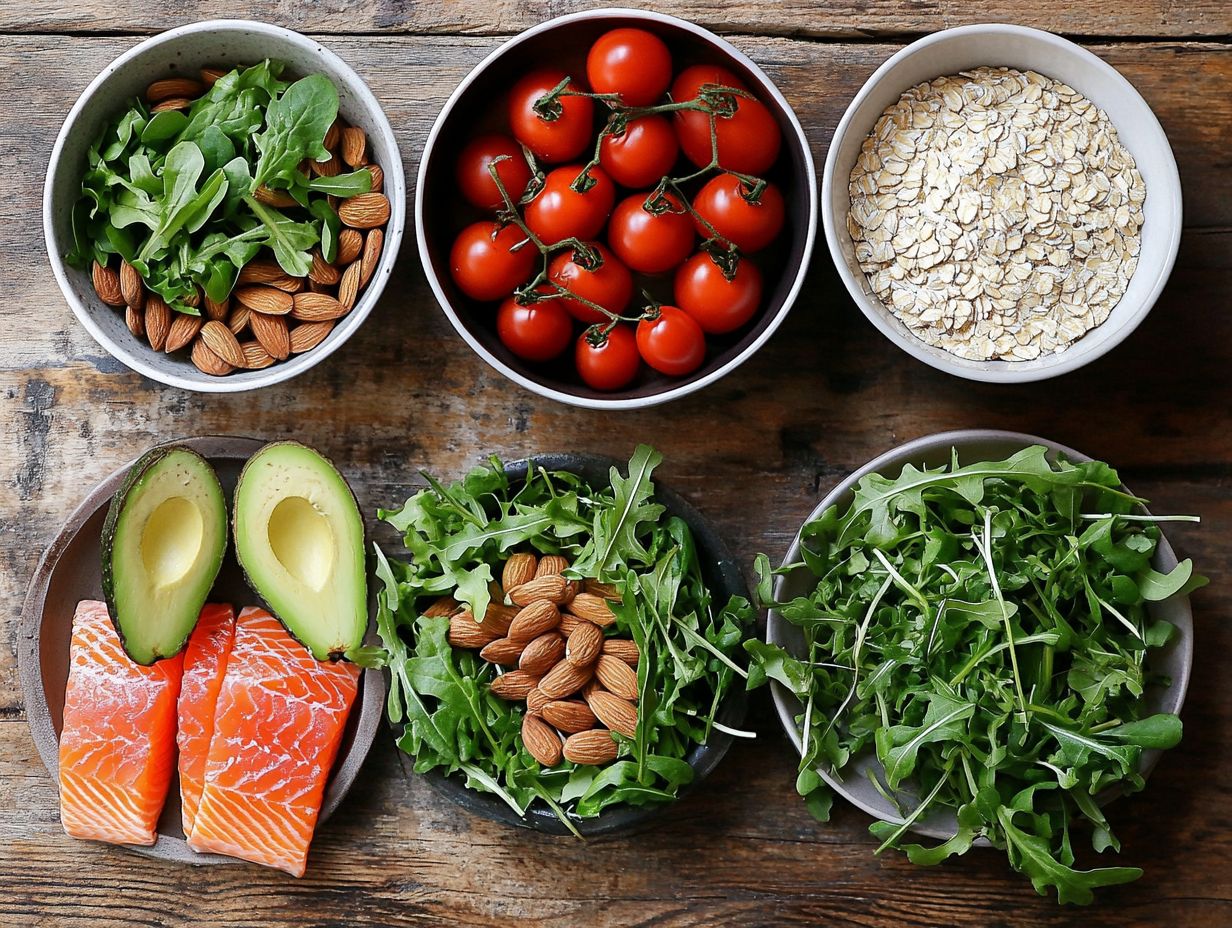
- Avocados, oats, nuts, fatty fish, and olive oil are excellent for heart health.
- These foods lower LDL (bad) cholesterol and increase HDL (good) cholesterol.
- Regular exercise and avoiding saturated and trans fats are also important.
1. Avocados
Avocados are a nutrient-rich food filled with healthy fats. They can lower LDL (bad) cholesterol while raising HDL (good) cholesterol. Their creamy texture makes them a fantastic addition to any diet.
Packed with omega-3 fatty acids and unsaturated fats, avocados contain essential nutrients that improve cholesterol levels and reduce inflammation. Their high fiber content also aids digestion and plays a crucial role in lowering cholesterol.
You can easily incorporate avocados into your meals. Toss them into salads, blend them into smoothies, or spread them on whole-grain toast. Elevate the flavor with sliced tomatoes or a sprinkle of lime for a delicious, heart-healthy treat.
2. Oats
Oats are a powerhouse of soluble fiber and rank among the top cholesterol-lowering foods. They help manage cholesterol levels by reducing LDL cholesterol, which is harmful to heart health.
This soluble fiber, especially beta-glucan, binds to cholesterol in your gut and helps your body excrete it.
Starting your day with oatmeal topped with fresh fruits and nuts is both beneficial and delicious. For a quicker option, try breakfast cereals with oat flakes paired with yogurt and berries.
You can also add oats to smoothies for a creamy texture and extra fiber, making it easier to enjoy their heart-healthy benefits.
3. Nuts
Nuts, such as almonds and walnuts, are excellent sources of healthy fats. They can significantly improve your cholesterol levels by lowering LDL cholesterol and raising HDL cholesterol.
Almonds are rich in vitamin E, magnesium, and fiber, all of which help reduce oxidative stress and inflammation key factors in heart disease. Walnuts offer a unique combination of omega-3 fatty acids that support cardiovascular health.
Incorporating these nutrient-rich foods into your meals is simple and enjoyable. Sprinkle chopped walnuts on salads or blend almond butter into smoothies for a flavor boost that enhances your nutrition.
Snacking on a handful of nuts can help you feel full and work towards maintaining balanced cholesterol levels.
4. Fatty Fish
Fatty fish, like salmon and sardines, are treasure troves of omega-3 fatty acids. These fats are well-regarded for boosting heart health, enhancing cholesterol levels, and lowering the risk factors linked to heart disease.
The essential fats mainly consist of EPA (eicosapentaenoic acid) and DHA (docosahexaenoic acid). Both play crucial roles in diminishing inflammation and supporting cardiovascular functions. Research indicates that eating these fish at least twice a week can greatly enhance overall heart health.
Grill salmon for a delicious dinner tonight or toss sardines into a robust salad to enjoy these nutritious options.
Other delightful ways to reap these omega-3 benefits include:
- Blending them into smoothies.
- Mixing canned varieties into pasta dishes.
This way, you can ensure that you and your loved ones remain heart-healthy while indulging in flavorful meals.
5. Olive Oil
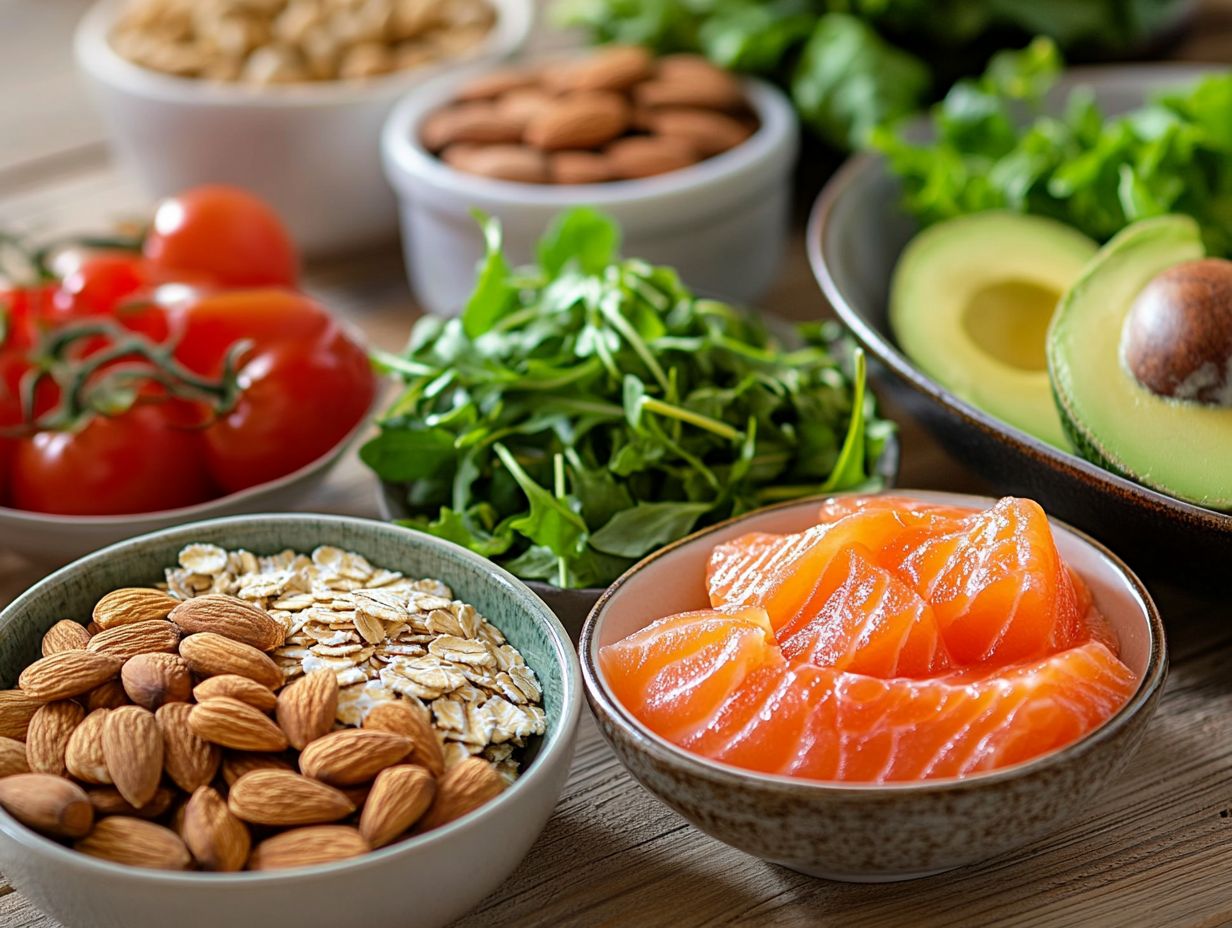
Olive oil, especially extra virgin, is an invaluable source of unsaturated fats that can greatly enhance your heart health. It improves cholesterol absorption, lowers bad cholesterol (LDL), and promotes good cholesterol (HDL). This oil is a cornerstone of Mediterranean diets, celebrated for its heart-healthy advantages.
Incorporate this versatile oil into your daily meals to tap into its protective qualities against heart disease. Use it as the base for salad dressings by combining it with balsamic vinegar, fresh herbs, and spices to elevate both flavor and nutrition.
Drizzle olive oil over roasted vegetables or use it to saut lean proteins for amplified taste and health benefits. Regularly swapping out saturated fats for olive oil can lead to notable improvements in your cardiovascular health over time.
What Is Cholesterol and Why Is It Important to Manage It?
Cholesterol is a waxy, fat-like substance present in every cell of your body. While it’s essential for producing certain hormones and vitamins, managing your cholesterol levels is crucial for preventing heart disease and ensuring overall cardiovascular health.
An imbalance between bad cholesterol (LDL) and good cholesterol (HDL) can lead to serious health issues. Understanding the roles of these two types of cholesterol is fundamental.
LDL cholesterol builds up in the walls of your arteries, leading to atherosclerosis. This significantly heightens your risk of heart attack and stroke. In contrast, HDL cholesterol aids in removing LDL from your bloodstream, promoting a healthier heart.
The American Heart Association recommends regular cholesterol screenings and suggests keeping your total cholesterol levels below 200 mg/dL. It’s especially important to maintain low LDL levels and high HDL levels. This balance is vital; neglecting it can set the stage for various cardiovascular diseases.
What Are the Different Types of Cholesterol?
You encounter two primary types of cholesterol: bad cholesterol (LDL), which contributes to plaque buildup in arteries, and good cholesterol (HDL), which helps remove LDL from the bloodstream.
Maintaining a balance between these two is crucial for your overall cardiovascular wellness. Ideally, aim for LDL levels below 100 mg/dL and HDL levels above 60 mg/dL.
Elevated LDL levels significantly increase your risk of heart disease and stroke, as they contribute to the narrowing of your arteries. Conversely, higher levels of HDL cholesterol are linked to a decreased risk of cardiovascular issues because they aid in removing excess cholesterol from your bloodstream.
Understanding and managing these cholesterol levels through mindful diet, regular exercise, and lifestyle choices is essential for your long-term heart health.
How Can High Cholesterol Affect Your Health?
High cholesterol can significantly elevate your risk of heart disease. When LDL cholesterol levels rise, they contribute to plaque formation in your arteries, which can lead to heart attacks and strokes serious complications that arise from poor cholesterol management.
If left unchecked, high cholesterol can lead to peripheral artery disease. This condition restricts blood flow to your limbs and increases the chances of developing other cardiovascular issues.
Managing your cholesterol is essential for your overall well-being. Simple dietary adjustments, like adding more fruits, vegetables, and whole grains while cutting back on saturated fats, can yield remarkable results.
Regular physical activity boosts heart health and helps maintain optimal cholesterol levels. Lifestyle changes are crucial in pursuing better cardiovascular health.
What Are the Recommended Cholesterol Levels?
The American Heart Association recommends that total cholesterol levels stay below 200 mg/dL. Your LDL cholesterol should ideally be below 100 mg/dL, and HDL cholesterol should be above 60 mg/dL.
These numbers are essential for promoting heart health and reducing your risk of cardiovascular diseases. During checkups, healthcare professionals evaluate your cholesterol levels through a simple blood test called a cholesterol test.
Regular monitoring is vital, as these levels are key indicators of your overall heart health. If your levels are elevated, consider lifestyle changes or medical interventions to prevent long-term complications like heart attacks or strokes.
Very low cholesterol levels can also indicate health concerns, making it crucial to find the right balance. Knowing these cholesterol levels helps you take proactive steps toward a healthier life.
How Can These Foods Help Lower Cholesterol?
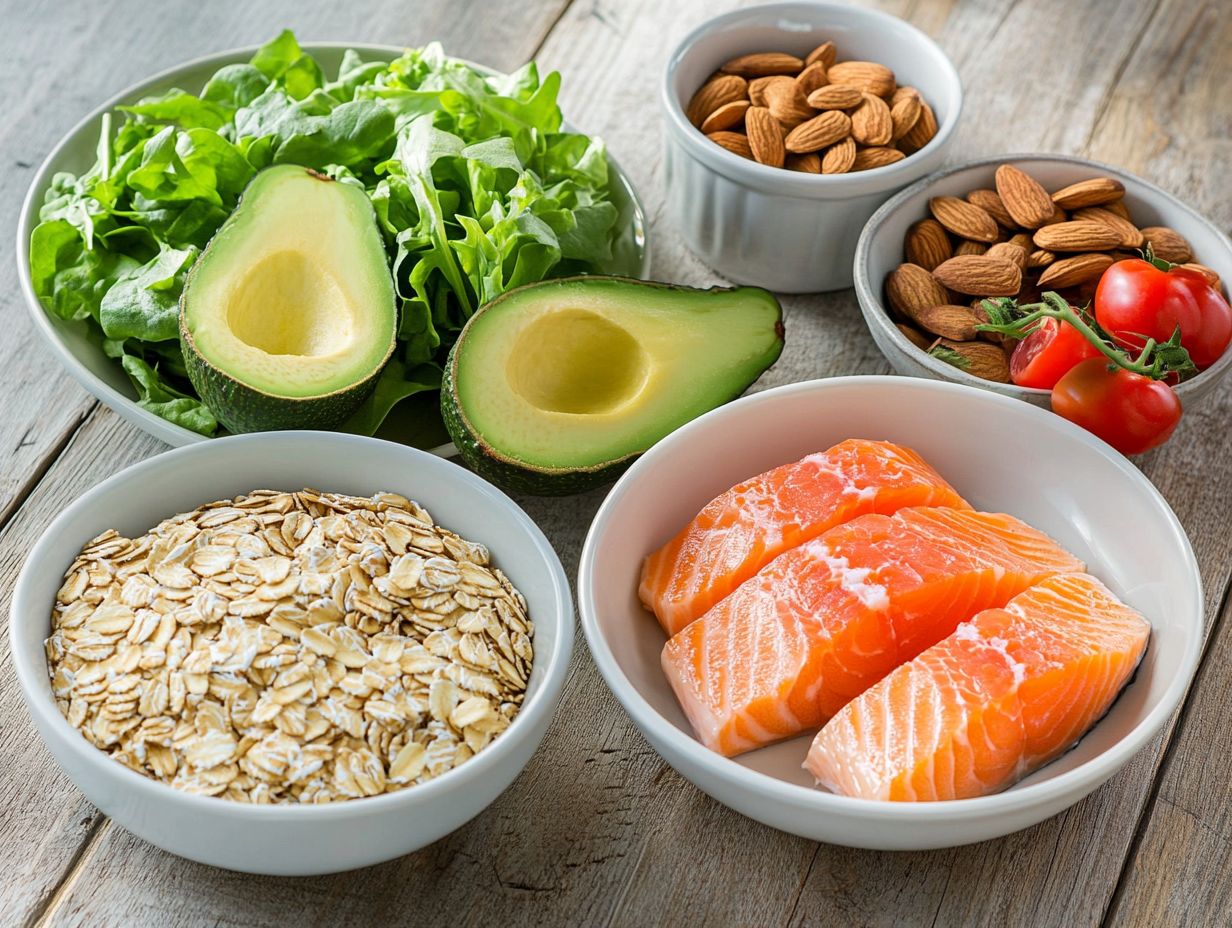
Incorporating foods that lower cholesterol those rich in soluble fiber, omega-3 fatty acids, and healthy fats can significantly enhance your cholesterol management and promote better heart health.
Research shows that oats are effective at reducing cholesterol absorption in your intestines. Nuts, particularly almonds and walnuts, are packed with healthy unsaturated fats that help lower LDL cholesterol when eaten regularly.
Fatty fish like salmon and mackerel are delicious and full of omega-3 fatty acids that support heart health. Drizzling extra virgin olive oil into your meals gives you a great source of healthy fats.
To include these foods in your routine, start your day with a hearty bowl of oatmeal topped with nuts. For lunch, enjoy a grilled salmon salad dressed with olive oil.
What Other Lifestyle Changes Can Help Manage Cholesterol Levels?
Along with dietary changes, maintaining a healthy lifestyle with regular physical activity and weight management can improve your cholesterol levels. Monitoring blood pressure is also important.
Engaging in moderate exercise for at least 150 minutes each week can lower bad cholesterol and boost good cholesterol. Simple actions like daily walks, cycling, or group fitness classes can make this goal easily achievable.
Achieving a healthy weight through balanced nutrition and consistent activity enhances your overall cardiovascular health. Managing stress through practices like meditation and yoga also positively impacts heart health.
Incorporating these lifestyle adjustments can lead to noticeable improvements in your cholesterol levels and heart health. Don’t wait; start making these changes today!
Are There Any Foods to Avoid for High Cholesterol?
To effectively manage your cholesterol levels and reduce the risk of heart disease, make sure to avoid foods rich in trans fats, saturated fats, and cholesterol. These culprits can elevate LDL cholesterol, often referred to as bad cholesterol, leading to cardiovascular issues.
Processed snacks like chips and cookies, as well as fried items such as doughnuts and some fast food, should be limited in your diet. Not only do these foods cause cholesterol spikes, but they also offer little nutritional value.
Be mindful of certain baked goods, particularly those made with butter or margarine, as they can significantly affect your heart health. Instead, choose whole foods like fruits, vegetables, and whole grains to promote better cholesterol management.
Incorporating sources of healthy fats, such as avocados and nuts, along with lean proteins, can further support cardiovascular function. By making these thoughtful choices, you can cultivate a heart-healthy diet that benefits your overall well-being.
How Often Should One Consume These Foods to See Results?
To achieve noticeable improvements in your cholesterol levels, include cholesterol-lowering foods in your diet regularly ideally several times a week. This practice is vital for maintaining heart health.
Adding healthy foods like oats, nuts, and fatty fish to your meal plans not only promotes better cholesterol levels but also enhances your overall dietary quality.
For instance, start your day with a warm bowl of oatmeal topped with walnuts for a nutritious boost. Enjoy fatty fish, such as salmon or mackerel, at least twice a week, perhaps paired with a colorful salad.
Snacking on a handful of nuts daily provides healthy fats and fiber, which are essential for heart wellness. Remember, consistency is key; make these foods staples in your weekly menu to reap lasting benefits.
Are There Any Risks or Side Effects to Consider?
Including cholesterol-lowering foods in your diet can generally be safe, but be vigilant about potential risks, such as allergies to nuts or fish. Balanced consumption is key to avoiding adverse reactions.
You might be surprised that some whole grains or legumes can also trigger sensitivities in certain individuals. By incorporating a variety of foods, you provide your body with essential nutrients and minimize the risk of intolerances.
Moderation is vital; instead of relying too heavily on a select few foods, diversify your meals for improved health outcomes. Always pay attention to how your body responds, and when in doubt, consulting with a healthcare professional or nutritionist can help you craft a plan that meets your unique needs.
Can These Foods Be Beneficial for Those with Normal Cholesterol Levels?
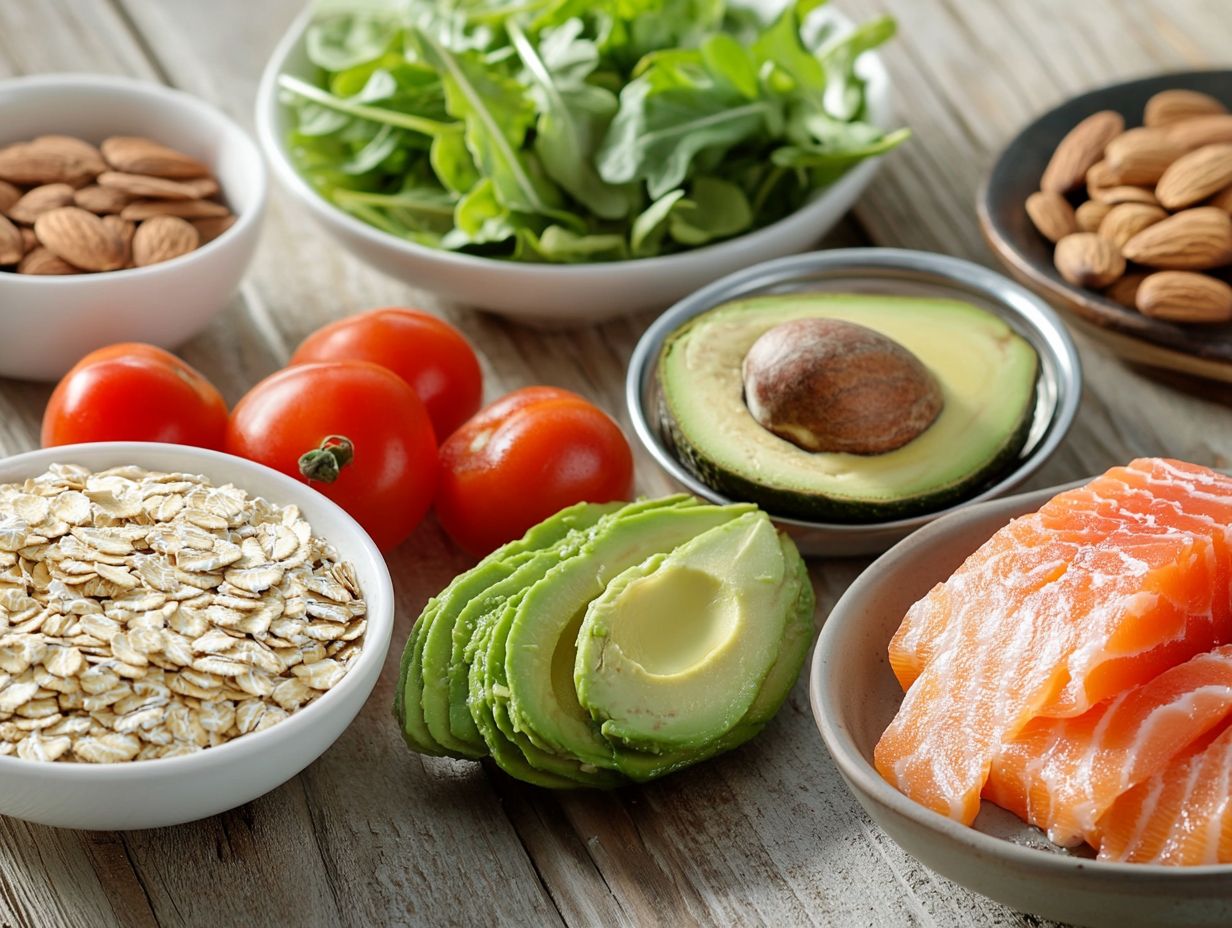
Even if you have normal cholesterol levels, adding cholesterol-lowering foods to your diet can offer significant heart health benefits and pave the way for long-term cardiovascular well-being by preventing future cholesterol imbalances.
A proactive dietary approach encourages you to enjoy whole grains, fruits, vegetables, and healthy fats. These foods not only assist your body in managing cholesterol effectively but also elevate your vitality.
By actively including these nutrient-dense options in your meals, you can significantly reduce the risk of developing heart disease-related conditions like hypertension and atherosclerosis. Maintaining this healthy eating pattern supports better weight management, boosts your energy, and enhances your mood, creating a comprehensive positive impact on your health.
Those who prioritize balanced nutrition often find it easier to maintain these habits, leading to an improved quality of life and greater longevity.
Frequently Asked Questions
What are the top 5 foods to help manage cholesterol levels?
- Avocado
- Oats
- Fatty Fish
- Nuts
- Olive Oil
For personalized dietary advice, consider consulting with a healthcare professional.
How can avocado help manage cholesterol levels?
You ll love how avocado is packed with healthy fats! These fats can lower bad cholesterol (LDL) and increase good cholesterol (HDL).
Why are oats recommended for managing cholesterol levels?
Oats contain soluble fiber. This fiber reduces cholesterol absorption in the bloodstream.
Can fatty fish really help with cholesterol levels?
Fatty fish like salmon and tuna are high in omega-3 fatty acids. Omega-3s can lower triglycerides and boost HDL levels.
How do nuts aid in managing cholesterol levels?
Nuts such as almonds and walnuts are rich in unsaturated fats and fiber. Make nuts your go-to snack to help manage cholesterol effectively!
Is olive oil a good choice for managing cholesterol levels?
Olive oil is a healthy fat that improves cholesterol levels. It contains monounsaturated fats that lower LDL and reduce heart disease risk.

